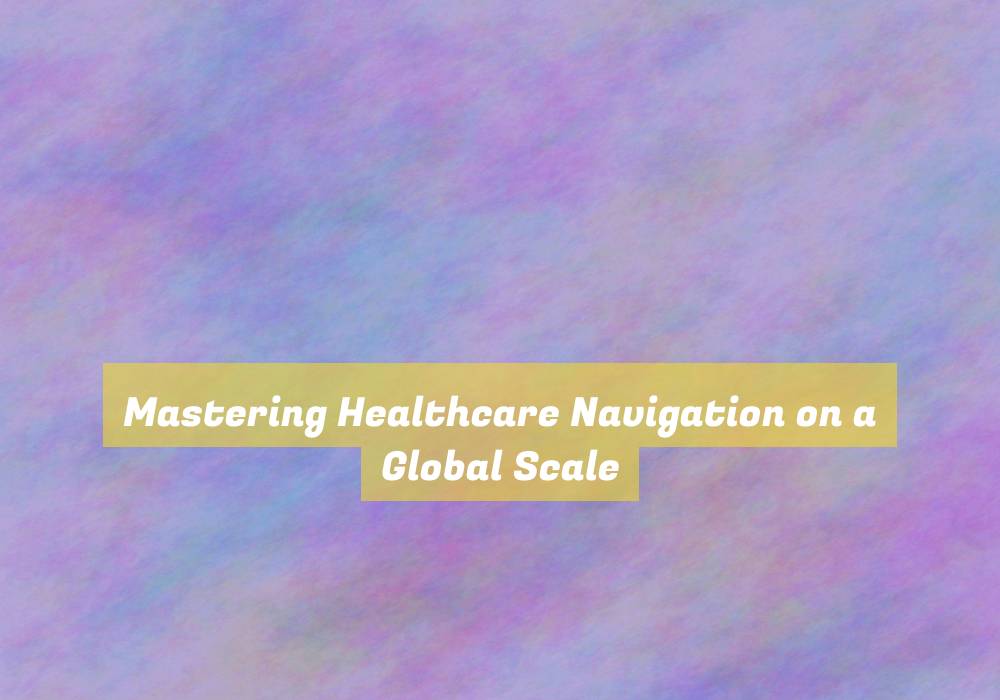Mastering Healthcare Navigation on a Global Scale
YouG??ve probably experienced the frustration of navigating healthcare systems in your own country, but have you ever considered the challenges of doing so on a global scale?
The complexities of healthcare can be magnified when crossing international borders, and understanding how to master healthcare navigation in a global context is crucial.
From medical tourism to cross-border care coordination, the intricacies of global healthcare systems present unique obstacles that demand innovative solutions.
As we explore this topic, youG??ll gain insight into the policy implications, the impact on patient care, and the potential for transformative change in the global healthcare landscape.
Understanding Global Healthcare Systems
Understanding global healthcare systems can be complex due to the diversity of approaches and structures across different countries. When you navigate these systems, itG??s essential to grasp the fundamental differences that exist.
For instance, some countries have universal healthcare, while others rely on private insurance. In some regions, healthcare is primarily run by the government, while in others, itG??s a mix of public and private entities. Understanding these variations is crucial as it impacts the accessibility and quality of healthcare services.
Additionally, cultural and societal norms influence how healthcare is delivered and received. When you comprehend these diverse systems, you can better appreciate the strengths and weaknesses of each approach. This understanding allows you to make informed decisions when seeking medical treatment, whether in your home country or abroad.
Navigating Medical Tourism
When considering medical tourism, itG??s crucial to thoroughly research the healthcare facilities and providers in the destination country. Look for accredited hospitals and clinics with a solid track record of successful procedures. Check for international certifications and accreditations to ensure the facility meets global standards of care.
ItG??s also important to research the qualifications and experience of the medical professionals whoG??ll be providing your treatment. Look for reviews and testimonials from previous patients to gauge the quality of care you can expect.
Additionally, consider the cultural and language barriers you might encounter during your medical journey. Ensure that there will be effective communication between you and the healthcare providers.
Understanding the legal and ethical standards in the destination country is also essential. Familiarize yourself with the medical laws and patient rights to protect yourself during your medical tourism experience.
Cross-Border Care Coordination
Navigating medical tourism requires careful consideration of healthcare facilities and providers, and this extends to the coordination of cross-border care. When seeking medical treatment abroad, itG??s essential to ensure a seamless transition between healthcare providers in different countries. One vital aspect of cross-border care coordination is the transfer of medical records and information. ItG??s crucial that your medical history, test results, and treatment plans are accurately shared between your home country and the destination facility. This facilitates continuity of care and ensures that the healthcare providers abroad have a comprehensive understanding of your health needs.
Furthermore, language barriers and cultural differences can pose significant challenges in cross-border care coordination. ItG??s important to work with healthcare facilitators or interpreters who can assist in effective communication between you, the healthcare providers, and support staff. Additionally, navigating the administrative processes, such as insurance coverage and payment procedures, in a foreign healthcare system can be complex. Engaging with professionals who specialize in cross-border care coordination can alleviate these challenges and ensure a smooth healthcare experience.
Ultimately, successful cross-border care coordination hinges on meticulous planning, effective communication, and collaboration among all involved parties.
Policy Implications for Global Healthcare
To improve global healthcare, policymakers must prioritize the development of comprehensive, adaptable strategies that address the diverse needs of individuals and communities worldwide. ItG??s crucial to establish policies that promote universal access to essential healthcare services while considering the unique cultural, social, and economic factors influencing healthcare delivery in different regions.
Additionally, thereG??s a need for policies that support research and innovation to address emerging global health challenges and promote the equitable distribution of medical advancements.
Furthermore, policymakers must focus on fostering collaboration among nations to address global health issues collectively. This includes the development of policies that facilitate the sharing of best practices, resources, and expertise across borders. Additionally, policies should be designed to encourage partnerships between public and private sectors to enhance healthcare infrastructure and service delivery on a global scale.
Moreover, policy implications for global healthcare should prioritize the establishment of regulatory frameworks that ensure the safety, efficacy, and affordability of healthcare interventions, including pharmaceuticals and medical technologies. These policies should also address ethical considerations and promote transparency to uphold the highest standards of patient care and public health.
Conclusion
Mastering healthcare navigation on a global scale requires understanding different healthcare systems. This involves familiarizing oneself with how healthcare is organized, funded, and delivered in different countries. It also entails learning about the variations in healthcare policies and regulations.
Another aspect of mastering global healthcare navigation is navigating medical tourism. Medical tourism refers to traveling to another country to receive medical treatment. This can involve researching and selecting reputable healthcare providers, understanding the costs and risks involved, and coordinating travel arrangements.
Coordinating cross-border care is another important aspect of global healthcare navigation. This may include seeking treatment in another country due to limited access or specialized expertise, or coordinating care when living in one country but receiving treatment in another. This can involve working with healthcare providers in both countries and ensuring that medical records and information are effectively shared.
Addressing policy implications is also crucial in mastering global healthcare navigation. This involves understanding the policies and regulations that govern cross-border healthcare, such as insurance coverage, reimbursement, and legal and ethical considerations. It may also involve advocating for policy changes that can improve access to high-quality care for individuals seeking healthcare across borders.
By taking an active role in your healthcare decisions and seeking out the best options for your needs, you can access high-quality care from around the world. With the right knowledge and support, you can confidently navigate the global healthcare landscape to receive the best possible care.





